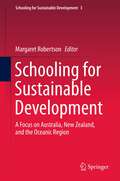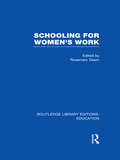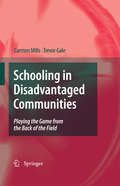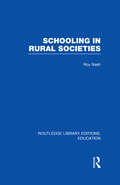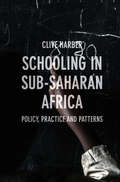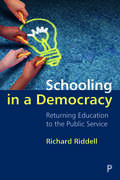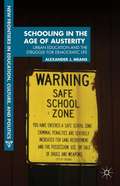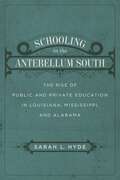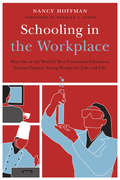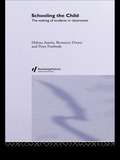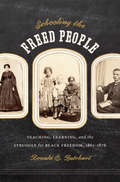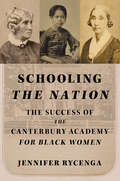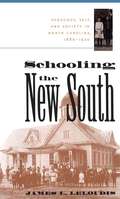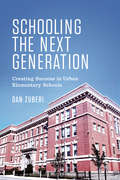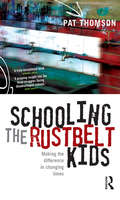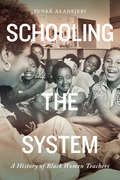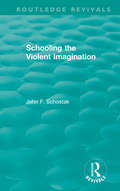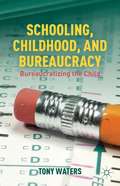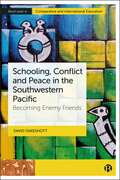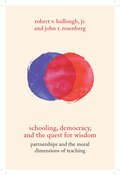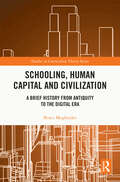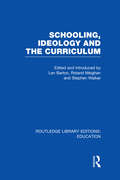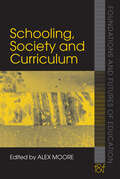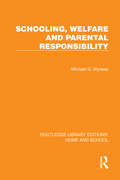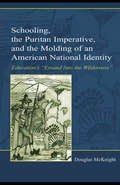- Table View
- List View
Schooling for Sustainable Development:
by Margaret Robertson"This book Schooling for Sustainable Development: A Focus on Australia, New Zealand and the Oceanic Region, is the product of passionate interests of teachers, scholars and researchers located in diverse parts of the Australasian region. Working with their colleagues within local contexts they have conducted research and gathered together information for practitioners and students interested in learning more about sustainable lifestyle practices. Some of the work has taken place in remote locations and some has been in within the confines of major cities. The Australasian Region brings together people and cultures that link traditional economies to global networks and lifestyles. Diverse terrain, politics and responses typify the region. Close to Asia there are lingering ties with old European ways and cultural beliefs. The major economies of Australia and New Zealand provide the lead with development practices for lesser economies such as Papua New Guinea, Fiji and the many island nations scattered throughout the South Pacific. This complexity is not easily represented. Key issues relate to land ownership, mobilities within the region and the gradual dissemination of knowledge, skills and wealth. The book will provide both reference material and interesting reading for teachers, researchers and practitioners in interested in community based perspectives on sustainability. We have learnt from each other and hope that others will benefit from our efforts."
Schooling for Women's Work (Routledge Library Editions: Education)
by Rosemary DeemThis collection of original papers shows how women in Britain are still being discriminated against during schooling, despite the existence of legislation prohibiting such discrimination and despite apparent concern with promoting equality between the sexes in education. Focusing on the current situation and experiences of women in education and their subsequent entry to, and experiences of, the labour market, the book shows how the category of gender is made relevant in the education of women: how it is influential in structuring their actions, beliefs, values and life chances, and how it provides them with a set of contradictions about their role in society.
Schooling in Disadvantaged Communities
by Carmen Mills Trevor GaleBased on a study of one secondary school located in a disadvantaged community in Australia, this book provides a different perspective on what it means to 'play the game' of schooling. Drawing on the perspectives of teachers, parents and students, this book is a window through which to explore the possibilities of schooling in disadvantaged communities. The authors contend that teachers, parents and students themselves are all involved in the game of reproducing disadvantage in schooling, but similarly, they can play a part in opening up opportunities for change to enhance learning for marginalised students. Rather than only attempting to transform students, teachers should be also be concerned to transform schooling; to provide educational opportunities that transform the life experiences of and open up opportunities for all young people, especially those disadvantaged by poverty and marginalised by difference. The book is also designed to stimulate understanding of the work of Bourdieu as well as of a Bourdieuian approach to research. Seeing transformative potential in his theoretical constructs, it airs the possibility that schools can be more than mere reproducers of society.
Schooling in Rural Societies (Routledge Library Editions: Education)
by Roy NashIn industrialized societies the needs of people living in remote and sparsely populated areas are easily overlooked, whilst in developing countries the needs of the rural population are at once so obvious and so enormous that our practical concern is blunted. In this volume it is clearly demonstrated that the relationship between environment and schooling is no less pertinent in rural areas than urban areas, although most recent attention has been directed towards the latter. Roy Nash seeks to redress the balance and in this wide-ranging and comprehensive analysis he examines the educational needs of rural people both in the declining periphery of urban Europe and in the resource-starved areas of the developing world.
Schooling in Sub-Saharan Africa
by Clive HarberThis book is a comprehensive text for those interested in formal education in sub-Saharan Africa. It provides a thought-provoking overview of the key educational ideas, themes and issues facing schooling in Africa today, by drawing on a wide literature to examine evidence concerning both educational policy and the working realities of primary and secondary schools in Africa. Based on the author's forty years of experience in researching and publishing on education in Africa, it takes a balanced but critical approach to analysing education in Africa, and discusses both positive and negative patterns across the region, as well as identifying differences between and within countries. The book examines major questions of educational provision, structure, content and process but does so in a way that raises challenging questions about gender, inequality, violence, authoritarianism and democracy in education as well the fundamental question of whether education is achieving its desired outcomes. It will be of great interest to students and researchers working in the fields of comparative and international education, education and international development, African education, African studies and development studies.
Schooling in a Democracy: Returning Education to the Public Service
by Richard RiddellThe COVID-19 pandemic has left inequalities in schools wider and uncertainty about the future greater. Now seems an appropriate time to think about the contribution schooling makes to the communities it serves and the country generally. However, drawing on his recent research, Richard Riddell argues that the increasingly narrow focus of Education governance after 20 years of reform has made new thinking impossible and has degraded public life. Nevertheless, he highlights new possibilities for democratic behaviour and the opening up of schooling to all it serves.
Schooling in the Age of Austerity: Urban Education And The Struggle For Democratic Life (New Frontiers In Education, Culture And Politics Ser.)
by Alexander J. MeansThrough a case study in a Chicago public school, Means demonstrates that, despite the fragmentation of human security in low-income and racially segregated public schools, there exist positive social relations, knowledge, and desire for change that can be built upon to promote more secure and equitable democratic futures for young people.
Schooling in the Antebellum South: The Rise of Public and Private Education in Louisiana, Mississippi, and Alabama
by Sarah L. HydeIn Schooling in the Antebellum South, Sarah L. Hyde analyzes educational development in the Gulf South before the Civil War, not only revealing a thriving private and public education system, but also offering insight into the worldview and aspirations of the people inhabiting the region. While historians have tended to emphasize that much of the antebellum South had no public school system and offered education only to elites in private institutions, Hyde’s work suggests a different pattern of development in Louisiana, Mississippi, and Alabama, where citizens actually worked to extend schooling across the region. As a result, students learned in a variety of settings—in their own homes with a family member or hired tutor, at private or parochial schools, and in public free schools. Regardless of the venue, Hyde shows that the ubiquity of learning in the region proves how highly southerners valued education.As early as the 1820s and 1830s, legislators in these states sought to increase access to education for less wealthy residents through financial assistance to private schools. Urban governments in the region were the first to acquiesce to voters’ demands, establishing public schools in New Orleans, Natchez, and Mobile. The success of these schools led residents in rural areas to lobby their local legislatures for similar opportunities. Despite an economic downturn in the late 1830s that limited legislative appropriations for education, the economic recovery of the 1840s ushered in a new era of educational progress.The return of prosperity, Hyde suggests, coincided with the maturation of Jacksonian democracy—a political philosophy that led southerners to demand access to privileges formerly reserved for the elite, including schooling. Hyde explains that while Jacksonian ideology inspired voters to lobby for schools, the value southerners placed on learning was rooted in republicanism: they believed a representative democracy needed an educated populace to survive. Consequently, by 1860 all three states had established statewide public school systems. Schooling in the Antebellum South successfully challenges the conventional wisdom that an elitist educational system prevailed in the South and adds historical depth to an understanding of the value placed on public schooling in the region.
Schooling in the Workplace: How Six of the World's Best Vocational Education Systems Prepare Young People for Jobs and Life (Work and Learning Series)
by Nancy HoffmanWhich non-American education systems best prepare young people for fulfilling jobs and successful adult lives? And what can the United States—where far too many young people currently enter adulthood without adequate preparation for the twenty-first-century job market—learn, adopt, and adapt from these other systems? In Schooling in the Workplace, Nancy Hoffman addresses these questions head on, arguing that &“the smartest and quickest route to a wide variety of occupations for the majority of young people in the successful countries—not a default for failing students—is a vocational program that integrates work and learning.&” As she notes, the programs that successfully integrate work and learning all share a fundamental commitment to helping young people find successful careers: &“The purpose is not &‘college for all,&’ as in the United States today, but rather to provide the education and training young people need to prepare for a career or calling.&” Schooling in the Workplace explores the vocational education programs in a wide range of countries, focusing in rich and useful detail on six in particular: Australia, Austria, Germany, the Netherlands, Norway, and Switzerland. Framing these discussions, however, is a persistent focus on American circumstances and challenges. Far more than a survey of six &“foreign&” programs, this is a book prompted by and organized around the policy and practical challenges facing the United States.
Schooling the Child: The Making of Students in Classrooms
by Peter Freebody Helena Austin Bronwyn DwyerWhat is a child?How is the concept of childhood defined?This book aims to explore these perennial and complex questions by looking at the way in which society constructs and understands childhood. The authors focus in particular on the school, a key location within which social and cultural notions of childhood are defined and performed.The book is divided into three major parts:Part 1 frames the accepted notions of childhood and schooling, and introduces ethnomethodological analysis as a tool to rethink current versions of the child.Part 2 focuses on how school students become members of a category within the institution of the classroom. The authors explore this idea through transcripts of talk between teachers and students, and amongst students themselves in two classroom studies.Part 3 looks at the materials of education, concentrating specifically on children's texts. The authors examine how such texts portray a notion of the child within the story, and also assume a notion of the child as reader of the story.This important book shows how much is at stake for children in accepting adults' deep-seated notions of childhood. It will be of great interest to educational researchers and policy makers, sociologists of childhood, teachers and student teachers.
Schooling the Freed People: Teaching, Learning, and the Struggle for Black Freedom, 1861-1876
by Ronald E. ButchartConventional wisdom holds that freedmen's education was largely the work of privileged, single white northern women motivated by evangelical beliefs and abolitionism. Schooling the Freed People shatters this notion entirely. For the most comprehensive quantitative study of the origins of black education in freedom ever undertaken, Ronald E. Butchart combed the archives of all of the freedmen's aid organizations as well as the archives of every southern state to compile a vast database of over 11,600 individuals who taught in southern black schools between 1861 and 1876. Based on this path-breaking research, he reaches some surprising conclusions: one-third of the teachers were African Americans; black teachers taught longer than white teachers; half of the teachers were southerners; and even the northern teachers were more diverse than previously imagined. His evidence demonstrates that evangelicalism contributed much less than previously believed to white teachers' commitment to black students, that abolitionism was a relatively small factor in motivating the teachers, and that, on the whole, the teachers' ideas and aspirations about their work often ran counter to the aspirations of the freed people for schooling. The crowning achievement of a veteran scholar, this is the definitive book on freedmen's teachers in the South as well as an outstanding contribution to social history and our understanding of African American education.
Schooling the Nation: The Success of the Canterbury Academy for Black Women (Women, Gender, and Sexuality in American History)
by Jennifer RycengaFounded in 1833 by white teacher Prudence Crandell, Canterbury Academy educated more than two dozen Black women during its eighteen-month existence. Racism in eastern Connecticut forced the teen students to walk a gauntlet of taunts, threats, and legal action to pursue their studies, but the school of higher learning flourished until a vigilante attack destroyed the Academy. Jennifer Rycenga recovers a pioneering example of antiracism and Black-white cooperation. At once an inspirational and cautionary tale, Canterbury Academy succeeded thanks to far-reaching networks, alliances, and activism that placed it within Black, women’s, and abolitionist history. Rycenga focuses on the people like Sarah Harris, the Academy’s first Black student; Maria Davis, Crandall’s Black housekeeper and her early connection to the embryonic abolitionist movement; and Crandall herself. Telling their stories, she highlights the agency of Black and white women within the currents, and as a force changing those currents, in nineteenth-century America. Insightful and provocative, Schooling the Nation tells the forgotten story of remarkable women and a collaboration across racial and gender lines.
Schooling the New South
by James L. LeloudisSchooling the New South deftly combines social and political history, gender studies, and African American history into a story of educational reform. James Leloudis recreates North Carolina's classrooms as they existed at the turn of the century and explores the wide-ranging social and psychological implications of the transition from old-fashioned common schools to modern graded schools. He argues that this critical change in methods of instruction both reflected and guided the transformation of the American South. According to Leloudis, architects of the New South embraced the public school as an institution capable of remodeling their world according to the principles of free labor and market exchange. By altering habits of learning, they hoped to instill in students a vision of life that valued individual ambition and enterprise above the familiar relations of family, church, and community. Their efforts eventually created both a social and a pedagogical revolution, says Leloudis. Public schools became what they are today--the primary institution responsible for the socialization of children and therefore the principal battleground for society's conflicts over race, class, and gender. Southern History/Education/North Carolina
Schooling the Next Generation
by Dan ZuberiPublic schools are among the most important institutions in North American communities, especially in disadvantaged urban neighbourhoods. At their best, they enable students to overcome challenges like poverty by providing vital literacy and numeracy skills. At their worst, they condemn students to failure, both economically and in terms of preparing them to be active participants in a democratic society.In Schooling the Next Generation, Dan Zuberi documents the challenges facing ten East Vancouver elementary schools in diverse lower-income communities, as well as the ways their principals, teachers, and parents are overcoming these challenges. Going beyond the façade of standardized test scores, Zuberi identifies the kinds of school and community programs that are making a difference and could be replicated in other schools. At the same time, he calls into question the assumptions behind a test score-driven search for "successful schools." Focusing on early literacy and numeracy skills mastery, Schooling the Next Generation presents a slate of policy recommendations to help students in urban elementary schools achieve their full potential.
Schooling the Rustbelt Kids: Making the difference in changing times (Studies In Education Ser.)
by Pat Thomson'A truly exceptional book.' - Michael W. Apple, University of Wisconsin, Madison'A gripping insight into the local struggles facing disadvantaged schools and a compelling account of the injustice of their place in the bigger picture.' - Professor Geoff Whitty, Director, Institute of Education, University of LondonSchools in disadvantaged areas are struggling in the current economic and political environment. Like schools everywhere they are being asked to do more with less, but they face more obstacles.In recent years education policy has shifted from a holistic approach to learning to a focus on narrow educational outcomes: spelling, reading and writing. Thomson shows that this approach penalises disadvantaged schools and argues that educational and social disadvantage are inextricably linked in children's everyday lives.Examining primary and secondary schools in disadvantaged areas in a post-industrial ('rustbelt') city, Schooling the Rustbelt Kids reopens the debate about inequality in schooling. It provides concrete evidence that typical government policies in the Western world are not working, and that they are helping to create a permanent underclass. Thomson outlines an alternative whole of government approach to policy, which builds on those school programs that do make a real difference to educational outcomes.Thomson also emphasises the influence of local geography. Schools are coloured by particular neighbourhoods, permeated by national and global events, and tangled in complex networks of social relations. Interventions which work in one school may not work in others.
Schooling the System: A History of Black Women Teachers (Rethinking Canada in the World #8)
by Funké AladejebiIn post–World War II Canada, black women’s positions within the teaching profession served as sites of struggle and conflict as the nation worked to address the needs of its diversifying population. From their entry into teachers’ college through their careers in the classroom and administration, black women educators encountered systemic racism and gender barriers at every step. So they worked to change the system.Using oral narratives to tell the story of black access and education in Ontario between the 1940s and the 1980s, Schooling the System provides textured insight into how issues of race, gender, class, geographic origin, and training shaped women’s distinct experiences within the profession. By valuing women’s voices and lived experiences, Funké Aladejebi illustrates that black women, as a diverse group, made vital contributions to the creation and development of anti-racist education in Canada. As cultural mediators within Ontario school systems, these women circumvented subtle and overt forms of racial and social exclusion to create resistive teaching methods that centred black knowledges and traditions. Within their wider communities and activist circles, they fought to change entrenched ideas about what Canadian citizenship should look like.As schools continue to grapple with creating diverse educational programs for all Canadians, Schooling the System is a timely excavation of the meaningful contributions of black women educators who helped create equitable policies and practices in schools and communities.
Schooling the Violent Imagination (Routledge Revivals)
by John F. SchostakThe violent imagination begins in experiences of violation against the self and grows through the stories, myths, folktales and anecdotes of everyday life. Originally published in 1986, John Schostak discusses the educational, social and moral implications of the violent imagination in connection with theories of violence, childrearing practices, and schooling as a childrearing institution. He also looks at the relation between sexism, racism, drugs and the emergence of a vandalised sense of self. The book explores the complex ways in which images of violence pervade society, inform action and provide interpretations of events. Schools, the author argues, contribute towards the development of a violent imagination which guides judgements and actions. The child’s images and experiences of violation may involve physical assault or psychological forms of assault. Some of these experiences of violation and violence are considered normal, even moral (‘spare the rod and spoil the child’); others are considered abnormal, criminal, pathological – although the abstract logical form of each may be equivalent. Nevertheless, all such images contribute towards the development of a sense of violation, and children are schooled to accept normal forms and reject abnormal forms.
Schooling, Childhood, and Bureaucracy
by Tony WatersIn exploring the relationship between bureaucratic schooling and the individual child, Waters describes the persistence of educational inequality, child development, and the nature of bureaucracy. The conclusions point out how education bureaucracies frame both schooling and childhood as they relentlessly seek to create ever more perfect children.
Schooling, Conflict and Peace in the Southwestern Pacific: Becoming Enemy Friends (Bristol Studies in Comparative and International Education)
by David OakeshottBringing concepts from critical transitional justice and peacebuilding into dialogue with education, this book examines the challenges youth and their teachers face in the post-conflict settings of Bougainville and Solomon Islands. Youth in these places must reconcile with the violent past of their parents’ generation while also learning how to live with people once on opposing ‘sides'. This book traces how students and their teachers form connections to the past and each other that cut through the forces that might divide them. The findings illustrate novel ways to think about the potential for education to assist post-conflict recovery.
Schooling, Democracy, and the Quest for Wisdom: Partnerships and the Moral Dimensions of Teaching
by Robert V Bullough John R RosenbergIn response to growing concern in the 1980s about the quality of public education across the United States, a tremendous amount of energy was expended by organizations such as the Holmes Group and the Carnegie Forum to organize professional development schools (PDS) or “partner schools” for teacher education. On the surface, the concept of partnering is simple; however, the practice is very costly, complex, and difficult. In Schooling, Democracy, and the Quest for Wisdom, Robert V. Bullough, Jr. and John R. Rosenberg examine the concept of partnering through various lenses and they address what they think are the major issues that need to be, but rarely are, discussed by thousands of educators in the U.S. who are involved and invested in university-public school partnerships. Ultimately, they assert that the conversation around partnering needs re-centering (most especially on the purposes of public education), refreshing, and re-theorizing.
Schooling, Human Capital and Civilization: A Brief History from Antiquity to the Digital Era (Studies in Curriculum Theory Series)
by Bruce MoghtaderThis book explores the formation of human capital in education, interrogating its social and ethical implications, and examining its role in generating policies and practices that govern curriculum studies as an academic field. Using an inquiry approach and offering an intellectual history of human capital theory through a genealogical methodology, the author begins by contextualizing the formation of the theory and explores its correlation with the history of imperialism. Tracing the concept of human capital from ancient slave societies to colonial empires, the book arrives at the modern formulations of the concept in education systems and explores its impact on curriculum and pedagogy in the digital age. Asking whether an approach that represented slaves, machines, animals, and property in its history is appropriate for forward-looking democratic societies, the author then uncovers crucial implications for educational equity and teacher development. Presenting a unique genealogy of schooling humans as economic resources and offering a descriptive and critical analysis of its impact on education as lived experience, the author excavates ideas and mentalities by which we think about modern schooling processes. This approach supports the intellectual development of teachers and offers a critical assessment of power-knowledge relations in curriculum studies. Discerning associations between the human capital theory of education and technological progress with implications for ethics in the digital age, it will be an outstanding resource for scholars and graduates working across comparative and international education, the history of education, curriculum studies, digital education, and curriculum theory.
Schooling, Ideology and the Curriculum (Routledge Library Editions: Education)
by Stephen Walker Len Barton Roland MeighanAlthough the different contributions to this book range over a wide spectrum of substantive issues, they share a common interest. This is a concern to explore the ways in which notions of the relations between theory and practice, between belief and action, can be used to develop three kinds of sensitivity in the sociology of education. A sensitivity towards how school systems are created, maintained and made to function; towards developing a more refined, critical and constructive awareness of the reliability and validity of descriptions, analyses and explanations offered in this field of study; and a sensitivity towards the ways in which changes take place within the education system and how the insights and realisations generated in the discipline might be used to control such occurrences.
Schooling, Society and Curriculum (Foundations and Futures of Education)
by Alex MooreSchooling, Society and Curriculum offers a much needed reassessment and realignment of curriculum studies in the UK and international contexts. Comprising a collection of eleven original chapters by prominent, nationally and internationally known experts in the field of curriculum studies, the book leads and fosters critical, generic debates about formal education and its relationships to wider society. Focusing on key debates that have been present for as long as formal state education has been in existence, the contributors contextualise them within a future-orientated perspective that takes particular account of issues specific to life in the early years of the twenty-first century. These include globalisation and nationalism; poverty and wealth; what it means to be a good citizen; cultural pluralism and intolerance; and - centrally - what it is that young people need from a school curriculum in order to develop as happy, socially just adults in an uncertain and rapidly-changing world. The book is organized into four sections: issues and contexts values and learners school curricula in the digital age exploring the possible: globalisation, localisation and utopias.
Schooling, Welfare and Parental Responsibility (Routledge Library Editions: Home and School)
by Michael G. WynessIn the 1990s, issues of child protection, child abuse and delinquency had generated public and academic concerns over the ability of adults to underwrite the physical, moral and social welfare of children. At the same time, recent educational reform had provoked debate around the shifting balance of power between those most involved in child development – parents and teachers. Originally published in 1996, Schooling, Welfare and Parental Responsibility brings these two agenda together within a coherent theoretical framework and offers an empirical analysis grounded in perspectives of both parents and teachers.The book draws on recent British, European and North American research and provides the reader with an up-to-date account of the current state of affairs between parents and teachers at the time. Within a context of recent educational and social policy reform and drawing on interview material from parents and teachers, the author examines the common understandings of the concept of parental responsibility. Debates on sex education, the ‘interventionist’ welfare state, and the state of parental anxiety are explored through the accounts provided.Schooling, Welfare and Parental Responsibility is an eminently readable synthesis of theory, policy and empirical data and today can be read by students, teachers and welfare practitioners in its historical context.
Schooling, the Puritan Imperative, and the Molding of an American National Identity: Education's "Errand Into the Wilderness" (Studies in Curriculum Theory Series)
by Douglas McKnightPresent-day America is perceived by many as immersed in a moral crisis, with national identity fractured and uncertainty and anxiety about the future. Public schools in this country are, historically and still today, the major institution charged with preserving and teaching the symbols of national identity and a morality that is the concrete expression of those symbols and the ideas for which they stand. A widespread belief is that only through schooling can America be saved from the current "crisis," but the schools have failed in this mission and must be reformed. In this book, Douglas McKnight develops a historical interpretation of how the New England Puritans generated a powerful belief system and set of symbols that have fed American identity and contributed to preserving and perpetuating it into the present time. He explores the relationship between the purposes of education (and how this term has shifted in meaning) and the notion of an American identity and morality--rooted in the Puritan concept of an "errand into the wilderness"--that serves a particular sacred/secular purpose. The phrase "errand into the wilderness" is taken from a 1956 book by Perry Miller with this title, where it refers to the Puritan dream of creating a city in the wilderness (the North American Colonies) that would be a utopian community--a beacon for the rest of the world for how to organize and live in the ideal religious community. Highly pertinent to the current debate about the purposes and crisis in education and in America, morality in schools, the cultural function of education, the changing nature of the language of education, the complex relation of schooling and national identity, this book explicates these elements within the American psyche by exploring the effects of the Puritan "symbolic narrative" at three different points in American history: Puritans during the 1600s and 1700s; the Gilded Age, when the urban Protestant middle class ascended to cultural dominance; and the present age. Schooling, the Puritan Imperative, and the Molding of an American National Identity: Education's "Errand Into the Wilderness" makes an important contribution to the fields of curriculum studies and the history of education. It will interest students and scholars in these fields, as well as those in educational philosophy, religion and education, intellectual and social history, and American studies.
